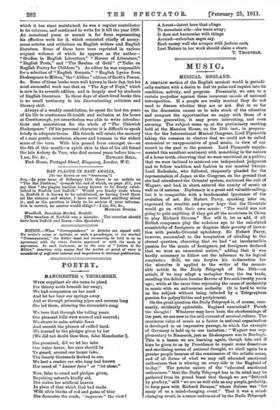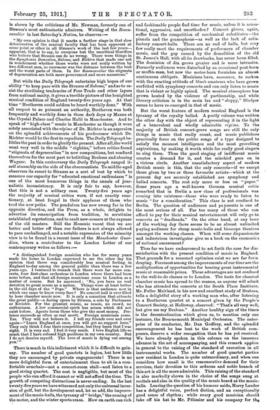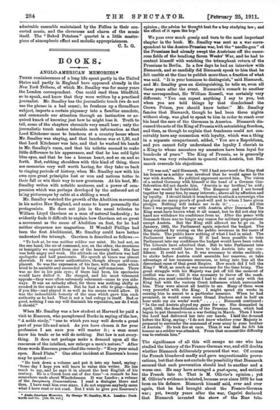MUSIC.
MUSICAL ENGLAND.
A CERTAIN section of the English musical world is periodi- cally smitten with a desire to feel its pulse and inquire into its condition, activity, and progress. Personally, we own to a certain prejudice against these recurrent moods of national introspection. If a people are really musical they do not need to discuss whether they are or not. Bat in so far as the discussion causes us to take stock of the situation and compare the opportunities we enjoy with those of a previous generation, it may prove interesting, and even amusing. The subject came up at the preliminary meeting held at the Mansion House, on the 15th inst., in prepara- tion for the International Musical Congress, Lord Plymouth taking the occasion to observe that we could not be called unmusical or unappreciative of good music, in view of our record in the past or the present. Lord Plymouth supple- mented this excellent sentiment with something in the nature of a home truth, observing that we were uncritical as a public ; that we were inclined to mistrust our independent judgment and to follow tradition and fashion in our musical likings. Lord Redesdale, who followed, eloquently pleaded for the representation of Japan at the Congress, on the ground that she had abandoned the Oriental system, embraced the cult of Wagner, and had, in short., entered the comity of music as well as of nations. Diplomacy is a great and valuable calling, but it is compatible with a fundamental ignorance of the evolution of art. Sir Hubert Parry, speaking later on, expressed the sensible and proper hope that the Orientals would go on with their own music : " The world was not going to gain anything if they got all the musicians in China to play Richard Strauss." Nor will it, let us add, if all British composers play the sedulous ape to the calculated eccentricity of foreigners or disguise their poverty of inve n- tion with pseudo-Oriental upholstery. Sir Hubert Parry, however, succumbed to the temptation of alluding to the eternal question, observing that we had "an inexhaustible passion for the music of foreigners, yet foreigners declared that we were an unmusical nation," adding that it was hardly necessary to follow out the inference to its logical conclusion. Still, we can forgive his indiscretion for the stimulus it applied to the writer of the memor- able article in the Daily Telegraph of the 16th—an article, if we may adapt a metaphor from the tea trade, recalling the delicious leonine flavour of five-and-twenty years ago; while at the same time espousing the cause of modernity in music with an antinomian audacity. (It is hard to write on the subject without being infected by a Telegraphese passion for polysyllables and periphrasis).
On the great question the Daily Telegraph is, of course, reso- nantly, stridently optimistic. England unmusical P Perish the thought ! Whatever may have been the shortcomings of the past, we are now in the mid-current of musical culture. The enormous value of music as a factor in national organisation is developed in an impressive passage, in which the example of Germany is held up to our imitation : " Wagner was sup- plementary to Bismarck, just as Shakespeare was to Burleigh. This is a lesson we are learning again, though late, and if time be given to us by Providence to repair some disastrous and sterilising errors of national thought, we shall again be a greater people because of the renaissance of the artistic sense, and of all forms of what we may call educated emotional enthusiasm that is stirring on every side in the England of to-day." The precise nature of the "educated emotional enthusiasm" that the Daily Telegraph has in its mind may be gathered from its proud boast that though we are "fettered by prudery," still " we are as well able as any people, probably, to keep pace with Richard Strauss," whose Salome was " for many of us a mind•changing event." That it was a mind- changing event. in a sense undreamt of by the Daily Telegraph. is shown by the criticisms of Mr. Newman, formerly one of Strauss's most enthusiastic admirers. Writing of the Rosen- cavalier in last Saturday's Nation, he observes "My own opinion is that it marks a further stage in that slow deterioration of the musical faculty that has been apparent at some point or other in all Strauss's work of the last few years— apparent, that is to say, to everyone but the uncritical thurifers who believe that Strauss can do no wrong. There were things in the Symphonia Domestica, Salome, and Blekira that made one ask in wonderment whether those works were not really written by two different men, so enormous was the distance between the best and the worst parts of them. In Der Roseneavaier the stigmata of degeneration are both more pronounced and more numerous."
But while the Daily Telegraph entertains high hopes of our ability "to keep pace with the Strauss of Salome," and so to re-
sist the sterilising tendencies of Free Trade and other lapses from national sanity, it gives a terrible picture of the benighted Musical condition of England twenty-five years ago. At that time " Beethoven could seldom be heard worthily done." With all respect to so puissant an authority, Beethoven was both frequently and worthily done in those dark days by Manus at the Crystal Palace and Charles Halle in Manchester. And to
speak of "high-class " music in Manchester as though it were solely associated with the regime of Dr. Richter is an aspersion on the splendid achievements of his predecessor which Dr. Richter would be the first to repudiate. The Daily Telegraph be-
littles the past in order to glorify the present. After all, the world went very well in the middle " eighties," before critics found "stigmata of degeneration" in new compositions, but confined themselves for the most part to belittling Brahma and abusing
Wagner. In this controversy the Daily. Telegraph ranged it- self staunchly on the side of the obscurantists. To middle-aged
observers its resort to Strauss as a sort of test by which to measure our capacity for "educated emotional enthusiasm" is one of the most humorous things in the annals of jour- nalistic inconsistency. It is only fair to say, however, that this is not a solitary case. Twenty-five years ago the majority of musical critics were, if not exactly reac- tionary, at least frugal in their applause of those who trod the new paths. The pendulum has now swung far in the opposite direction, and the Press, as a whole, delights to advertise its emancipation from tradition, to scrutinise established reputations, and to exalt new-comers at the expense
of the old masters. Still the Homeric vaunt that we are better and better off than our fathers is not always allowed to pass unchallenged, and a notable expression of the minority view is to be found in a recent issue of the Manchester Guar- dian, where a contributor to the London Letter of our contemporary writes as follows :— "A distinguished foreign musician who has for many years made his home in London expressed to me the other day his opinion that there was considerably less musical feeling in England to-day among the general public than there was a few years ago. I ventured to remark that there were far more con- certs, four first-class orchestras in London where there had been none before, and that all foreign musicians come to London as a matter of course. But he answered : 'No, you have no real devotion to great music as a nation. Things were at least better in the old days of the " Pops." Where is that audience now in which one came to know every face ? No concert hall is ever filled to hear chamber music now. It is only a sensation that attracts the great public—a daring opera by Strauss, a solo by Bachmann or Kreisler. For the greatest music, as music, no crowd, no enthusiasm. A low commercial spirit has arisen which did not exist before. Agents boom those who give the most money. Pre- tence succeeds as often as real merit. Foreign musicians come. Yes. They will not believe it. I tell my friends over and over again—"Leave England at once, you will got no support here." They only think I fear their competition, but they learn that I was right. It is very sad. I feel it very much. I love English life so much that I have refused high positions in my own country. But I do not deceive myself. The love of music is dying out among you.'"
There is much in this indictment which it is difficult to gain- say. The number of good quartets is legion, but how little they are encouraged by private engagements ! There is no more delightful form of entertainment than to sit in a com- fortable armchair—not a concert-room stall—and listen to a good string quartet. The cost is negligible, but most of the people who can afford it cannot or will not afford the time. The growth of competing distractions is never-ending. In the last twenty-five years we have witnessed not only the universal incur- sion of golf, but the development and, let us add, the improve- ment of the music-halls, the tyranny of " bridge," the coming of the motor, and the winter sports craze.. How on earth can rich
and fashionable people find time for music, unless it is sensa- tional, aggressive, and unorthodox? Concert givers, again, suffer from the competition of mechanical substitutes—the pianola and the gramophone—as well as the lack of satis- factory concert-halls. There are no end of halls, but very few really meet the requirements of performers of chamber music, and the gap caused by the demolition of the old St. James's Hall, with all its drawbacks, has never been filled. The dominion of din, grows greater and is more intrusive. Formerly audiences were disturbed by an occasional post-horn or muffin-man, but now the motor-horn furnishes an almost continuous obbligato. Musicians have, moreover, to reckon with the exacting attitude of biases amateurs who have grown surfeited with symphony concerts and can only listen to music that is violent or highly spiced. The musical atmosphere has grown heated by the violence of partisanship, and while literary criticism is in the main lax and " sloppy," Bludyer seems to have re-emerged in that of music.
But the worst feature of modern musical England is the tyranny of the royalty ballad. A portly volume was written the other day with the object of representing it in the light of a benevolent and wholly admirable regime. To the majority of British concert-goers songs are still the only things in music that really count, and music publishers practically force on the public songs of a type designed to satisfy the meanest intelligence and the most grovelling aspirations, by making it worth while for really good singers to sing them. Thus the good singing of indifferent music creates a demand for it, and the mischief goes on in a vicious circle. Another unsatisfactory aspect of modern British music is this, that the only concerts—if we except those given by two or three favourite artists—which at the present day are securely established are symphony and ballad concerts. The rest rely more or less on " paper." Some years ago a well-known German musical critio remarked that in Berlin a new class of professionals was coming into existence—those who were ready to listen to, music " for a consideration." This class is not confined to Berlin. The question of audiences and payments is one of the most serious of all. Far too many of those who can afford to pay for their musical entertainment will only go to concerts as " deadheads." On the other hand, at any hour of the working day there seems to be an almost unlimited paying audience for cheap music-halls and bioscope theatres amongst the working classes. When will some dispassionate and industrious investigator give us a book on the economics of national amusement?
Thus far we have endeavoured to set forth the case for dis- satisfaction with the present condition of music in England. That grounds for a reasoned optimism exist we are far from denying. Foremost among the improvements of our time are the multiplication of opportunities for hearing great instrumental music at reasonable prices. These advantages are not confined to the well-to-do classes or to London. The taste for classical chamber music has spread to the masses, as anyone will admit who has attended the concerts at the South Placie Institute. Mr. Fuller Maitland, in his new and excellent study of Brahma, tells a delightful story of a working man who, after listening to a Beethoven quartet at a concert given by the People's Concert Society, at Holloway, observed : " That's all very well, but give me my Brahma." Another healthy sign of the times is the decentralisation which gives us, to mention only one instance, the Bournemouth Municipal Orchestra. The enter- prise of its conductor, Mr. Dan Godfrey, and the splendid encouragement he has lent to the work of British com- posers, deserve a wider recognition than he has yet received. We have already spoken in this column on the immense advance in the art of accompanying, and this remark applies in general to the raising of the standard of execution in all instrumental works. The number of good quartet parties now resident in London is quite extraordinary, and when one considers how small is the remunerative demand for their services, their devotion to this arduous and noble branch of this art is all the more admirable. This raising of the standard is also markedly shown in the choice of the songs sung at recitals and also in the quality of the music heard at the music- halls. Leaving the question of his humour aside, Harry Lauder has a delightful voice, perfect diction, and an exceptionally good sense of rhythm; while every good musician should take off his hat to ?dr. Pelissier and his company for the
admirable ensemble maintained by the Follies in their con- certed music, and the cleverness and charm of the music itself. The "Baked Potatoes" quartet is a little master- piece of atmospheric effect and melodic appropriateness.
C. L. G.








































 Previous page
Previous page